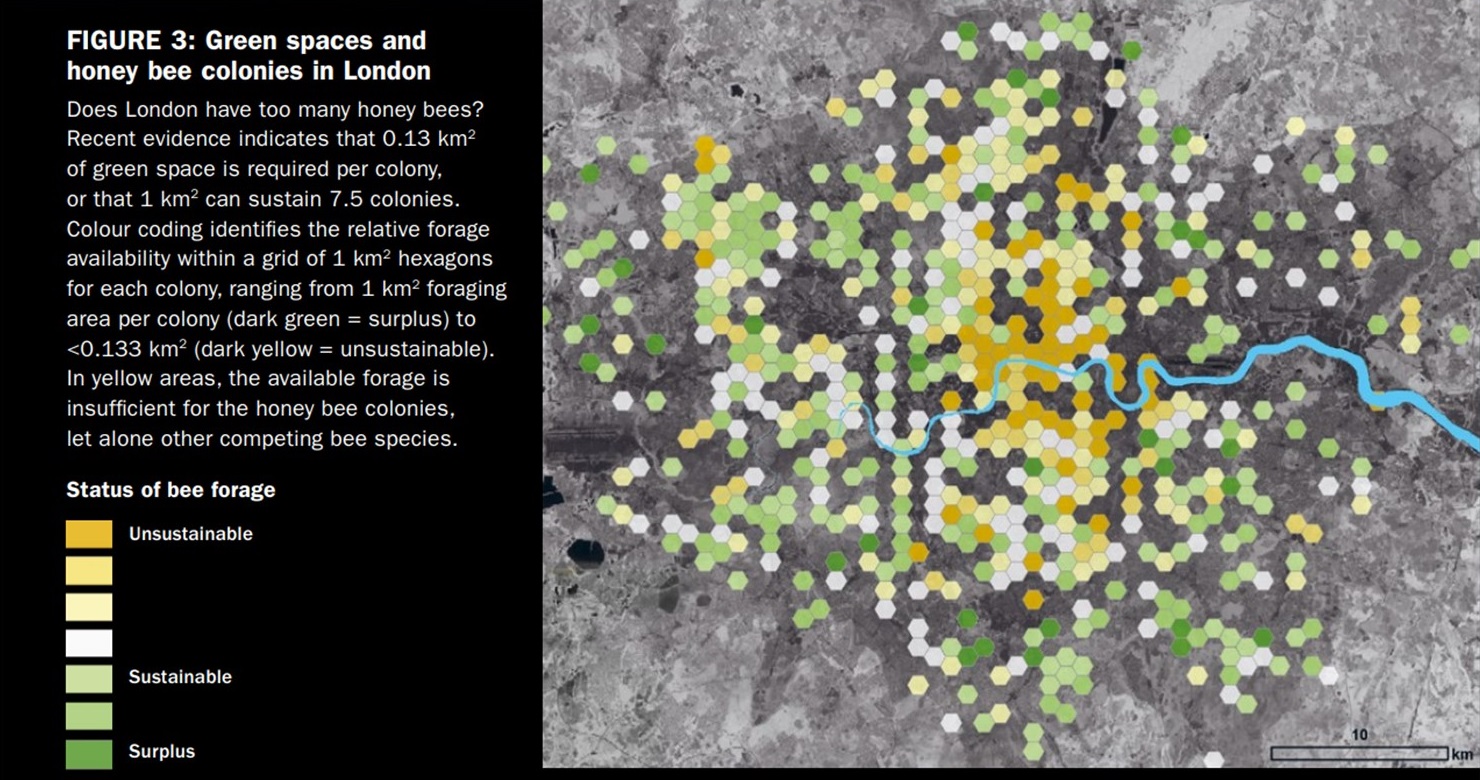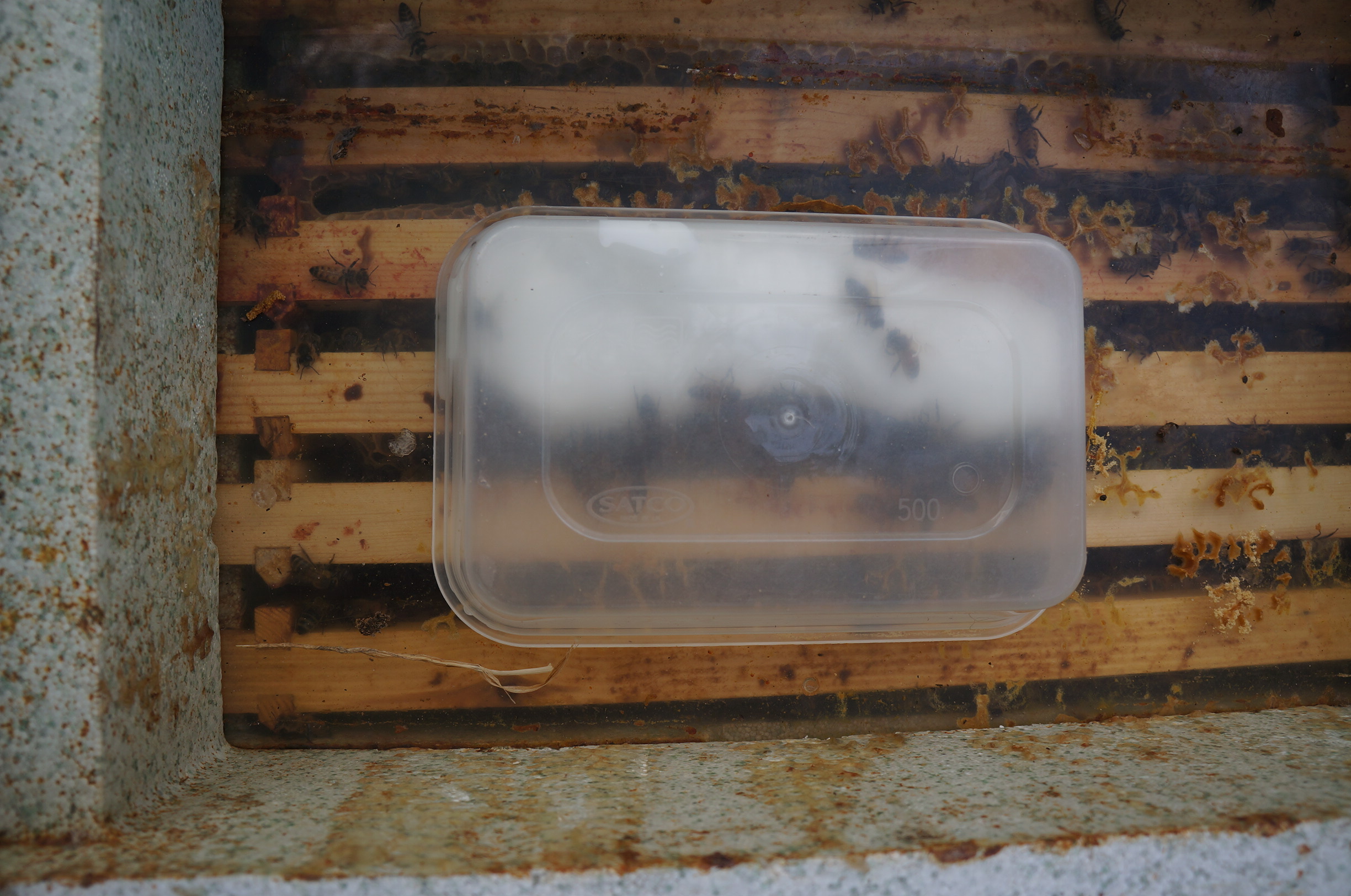 Abraham Lincoln
If given the truth, the people can be depended upon to meet any national crisis...
Abraham Lincoln
If given the truth, the people can be depended upon to meet any national crisis...
 Guildford news...
for Guildford people, brought to you by Guildford reporters - Guildford's own news service
Guildford news...
for Guildford people, brought to you by Guildford reporters - Guildford's own news service
Beekeeper’s Notes: Is Too Much Urban Beekeeping a Bad Thing?
Published on: 1 Nov, 2020
Updated on: 3 Nov, 2020
Hugh Coakley keeps bees in Worplesdon
It’s a very quiet time of the beekeeping year. Time for a bit of reading and a report from the Royal Botanical Gardens Kew on the state of the world’s plants and fungi has caught the attention of the beekeeping magazines.
The fascinating report, which talks about “our ethical duty of care for this planet as well as our own needs”, says the high number of honey bee colonies in London is threatening other bee species.

The yellow shows areas of London where honey bee concentrations are said to be unsustainable. Excerpt from Kew State of the Worlds Plants and Fungi. Click on the image to enlarge.
The chapter on building urban resilience with trees, bees and fungi says that “beekeeping [in London] to save bees could actually be having the opposite effect.”
Increasing evidence points to there not being enough forage to support even the honey bee populations that have sprung up in the capital. Honey bees in many areas “outcompete wild bees by monopolising floral resources,” says the report.

It is a quiet time but we are feeding two very small colonies with a sugar fondant. The bees were established late in the year and were too small to bring in enough forage to last them the winter.
Beekeeping generally gets a good press. Schoolchildren hear about the importance of bees pollinating flowers and crops and saving the bee is often seen as one small way we can help the planet. Public bodies and businesses, such as St Paul’s Cathedral and the Tate Modern, have set up colonies on the roofs of their town centre buildings safely thinking that they were doing good.
A report in The Independent said that managed bee colonies had trebled in the last 10 years in the City of London with the capital having “the densest bee population of any city in Europe, and possibly the world.”
Outbreaks of European Foulbrood (EFB), a notifiable bacterial infection that destroys colonies, were higher in London than anywhere else in England, Scotland or Wales.
Could too many honey bees be a problem in the Guildford area as well?
There are about 190 beekeeper members of the Guildford Beekeepers’ Association with, and I am guessing here, an average of five colonies each. Not all members keep bees but, continuing guessing with one wet finger in the air and all the others crossed for luck, that’s about 1,000 managed colonies.
The Kew report says that a colony needs 0.13 sq km of green space. So that is 130 sq km needed for managed colonies in the 271 sq km that Wikipedia says the Borough of Guildford enjoys.
The rough figures would suggest that we are ok on managed colonies. But that doesn’t take into account wild colonies. I am not aware of any estimates of wild colonies in the UK or in Surrey but there must be quite a few and that would be a factor. It would also be interesting to map out colonies in the town itself to see if there was an unsustainable concentration.
It would also be useful to know about wild colonies in the Guildford area. Do Dragon readers know of any wild colonies?
Responses to Beekeeper’s Notes: Is Too Much Urban Beekeeping a Bad Thing?
Leave a Comment Cancel replyPlease see our comments policy. All comments are moderated and may take time to appear.
Recent Articles
- Guildford Institute’s Crowdfunding Project for Accessible Toilet in its New Community and Wellbeing Centre
- Letter: Guildford – Another Opportunity Missed?
- Letter: GBC’s Corporate Strategy – Where Is the Ambition?
- My Memories of John Mayall at a Ground-breaking Gig in Guildford Nearly Six Decades Ago
- Westborough HMO Plans ‘Losing the Heart of the Street’ Says Resident
- College Invests to Boost Surrey’s Economy and Close Digital Skills Gap
- Community Lottery Brings Big Wins for Local Charities
- GBC Housing Plan Promises ‘A Vibrant Urban Neighbourhood’ Near Town Centre
- Hospital Pillows ‘Shortage’ at the Royal Surrey
- Updated: Caravans Set Up Camp at Ash Manor School


Recent Comments
- Ian Macpherson on Updated: Main Guildford to Godalming Road Closed Until August 1
- Sara Tokunaga on GBC Housing Plan Promises ‘A Vibrant Urban Neighbourhood’ Near Town Centre
- Michael Courtnage on Daily Mail Online Reports Guildford Has Highest-paid Council Officer
- Alan Judge on GBC Housing Plan Promises ‘A Vibrant Urban Neighbourhood’ Near Town Centre
- John Perkins on GBC Housing Plan Promises ‘A Vibrant Urban Neighbourhood’ Near Town Centre
- S Collins on GBC Housing Plan Promises ‘A Vibrant Urban Neighbourhood’ Near Town Centre
Search in Site
Media Gallery
Dragon Interview: Local Artist Leaves Her Mark At One of England’s Most Historic Buildings
January 21, 2023 / No Comment / Read MoreDragon Interview: Lib Dem Planning Chair: ‘Current Policy Doesn’t Work for Local People’
January 19, 2023 / No Comment / Read MoreA3 Tunnel in Guildford ‘Necessary’ for New Homes, Says Guildford’s MP
January 10, 2023 / No Comment / Read More‘Madness’ for London Road Scheme to Go Ahead Against ‘Huge Opposition’, Says SCC Leader
January 6, 2023 / No Comment / Read MoreCouncillor’s Son Starts Campaign for More Consultation on North Street Plan
December 30, 2022 / No Comment / Read MoreCounty Council Climbs Down Over London Road Works – Further ‘Engagement’ Period Announced
December 14, 2022 / No Comment / Read MoreDragon Interview: GBC Reaction to the Government’s Expected Decision to Relax Housing Targets
December 7, 2022 / No Comment / Read MoreHow Can Our Town Centre Businesses Recover? Watch the Shop Front Debate
May 18, 2020 / No Comment / Read More









Dave Hunter
November 1, 2020 at 6:45 pm
I believe that many miss the point. The honey bee species represent seven out of about 20,000+ species. The honey bee is a sophisticated insect that is a wonderful pollen gatherer; sticky pollen on hind legs destined for the hive. The vast majority of the other pollinators gather pollen dry on their hairy bodies and are very inefficient pollen gatherers; pollen falls off with each flower visit.
The difference between the two types: honey bees are pollen taker, the rest pollen spreaders. If you were a flower looking for pollen to be spread, which bee would you prefer?
This article closes with “looking for wild colonies”. 90 per cent of the bees are solitary, not social. Due to the widespread use of the honey bees, the bees that actually spread the pollen are missing. Those are the bees we should be caring about if we care about food pollination.